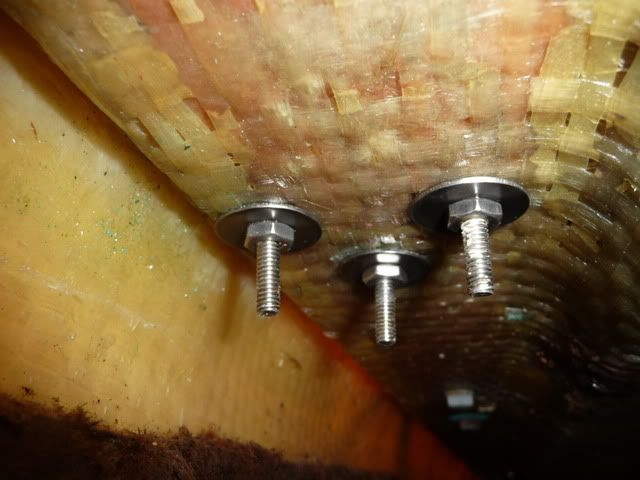Page 2 of 6
Posted: Fri Dec 24, 2010 10:30 pm
by gettaway
well,
I removed the bow rail, all but the aft bolts where it meets the deck,
the underside of the for deck was wet. I believe a few of the stanchion bases were leaking but the real culprit was the holding tank pump out deck fitting, The clown who installed it used # 8 wood screws and not enough sealant to close up a knats ass.
I am pretty sure this is where the water was coming from, it is mounted directly above a side stringer which would allow water to run forward, down and back to the vee berth stringer support.
I came to this conclusion after removing all of the side panels, I gained access to every stanchion base. the underside of the for deck was wet, but more like condensation, not from leaks at ethe bases except for three.
I sprayed all of the bolts with penetrating oil and then removed them all,
I had several break immediatly, the bolts were almost corroded through, at that point I decided to remove all of the bolts and replace them. what a job!
the hardest bolts to access were the to forward stanchions as the nuts were in the chain locker, I'll definately be sore tomorrow after those contortionist moves!
[img][img]
http://i862.photobucket.com/albums/ab19 ... 040862.jpg[/img][/img]
[img][img]
http://i862.photobucket.com/albums/ab19 ... 040863.jpg[/img][/img]
Posted: Fri Dec 24, 2010 10:49 pm
by gettaway


removing the stanchion, there was a "gasket under each base, however, the gasket was cut out for each bolt, allowing water to enter if not bedded correctly


cleaned

taped and silicone applied and skinning over

applying silicone to the screwes and counter sink in the base

screws in and snugged up (not tight yet)
Posted: Fri Dec 24, 2010 10:57 pm
by gettaway
I replaced all of the brass (or bronze) hardware with 316 stainless, I also added 316 SS fender washers to nut side of the bolts to add some backing , the originals did fine for 30 years, and I suppose as a system they're strong, but I was a little surprised by the lack of not only backing plates, but a number of the bolts didn't even have washers, maybe they have been removed since built to try and seal leaks, but if you haven't checked yours, the next time you lean against or over the bow rail, think about # 10 brass or bronze screws with no backing plate and tiny washers....
It got dark on me and it is Christmas eve, but I'll get photos of the new fender washers and the dry underside, I left a fan and a dehumidifier running, but the condensation had already dried by the time i was finished rebedding the rials
I'll also post some photos of the screws that had corroded in two
Posted: Fri Dec 24, 2010 11:03 pm
by gettaway
by the way, the foredeck is dirty from the project, it's not faded gel coat or a neglected boat!

Posted: Fri Dec 24, 2010 11:05 pm
by gettaway

a beautiful sunny day in Coronado, and a very high tide!
Posted: Sat Dec 25, 2010 12:22 am
by prowlersfish
With all that work , I would have used a better sealant , like boat life or 3m 4000 or even 4200/5200 . or at least a Marine grade silicone sealant . ( If I am incorrect on what you used I am sorry )
One thing I have use on the bases is Capt Tollys so you don't have to disassemble them . I use it as a preventative just in case.
http://www.captaintolley.com
Posted: Sat Dec 25, 2010 12:54 am
by gettaway
Prowlerfish,
Thanks for the advice, I might want or need to remove a stanchion some day, that won't happen with 3M 4200 / 5200.
the professionals in the industry here use pure silicone sealant, and my own experience has proven it works well and can be removed "WHEN"I need to make a repair.
Ford or Chevy, valvoline or castrol, mercruiser or crusaders.........
I could have put painters caulk on some of the joints and it would have been better that what was there ! LOL

Posted: Sat Dec 25, 2010 11:28 am
by randyp
Take it from old mr silicone himself, except for the "hi-temp" silicones (that contain iron oxide) and the "bathtub" kind that contains an anti-fungistat (like arsenic) they're like baloney - all the same - marine grade, hobby grade, automotive grade, blah, blah, blah.....hell, I even designed some of the containers and names in the past! It looks like you did a good job on those stanchions, and I, of course, think silicone is the right choice for this type of work, so long as it's used above the waterline....silicone likes to migrate away from water pressure so it's not good for undewater repairs or sealing. If you have silicone "slop" on your deck let it cure up and you can remove it in a week or so with a razor or rub it off with really fine sandpaper or rubbing compound. A trick for tooling a really smooth finish like around window or other trim is to smooth it with an ice cube or even handier, lick your finger and run it over the bead - I used to work with hi-rise glazing contractors who use a lot of silicone - known in the trade as "spit-tooling" for obvious reasons. The silicone won't stick to anything wet when it's uncured so you'll get a nice shiny/smooth bead. And there, children, is my Christmas present to you all. Ho ho ho, back to my figgy pudding, and trying to give the first mate her Christmas Goose.....
Posted: Sat Dec 25, 2010 12:02 pm
by gettaway
Randy,
agreed on the silicone, I have a few friends in the boat trades and they all use "good" silicone for bedding and sealing topside stuff..windows, rails,cleats etc. the bolts create the bond, the silicone creates the seal, and when it needs to be removed, and it will, the two may part without creating a bigger project of fiberglass / wood repair.
As far as brand, they also have said that go ahead, pay 14.00 for "marine" silicone, or 5-7.00 for GE , in the end, you are buying the same product.
Merry Christmas,
Posted: Sat Dec 25, 2010 8:04 pm
by gettaway
Posted: Sat Dec 25, 2010 8:12 pm
by randyp
Ahhh man, I wanna be back on the boat after seeing those pictures - oh well, only a few short monthsa until the snow and ice melt. One more thing on the silicone. There are two basic cure systems to the one-part silicone that you buy in tubes and caulkers - acetic acid cure and alcohol cure. The acetic acid is most common and you'll recognize it by its vinegar odor. The other one smells slightly musty. The acetic acid cure can attach delicate metals, but you'll have no issue with those thick stainless screws. The alcohol cure (GE Silicone II for instance) sets up slower but is better for plexiglas bonding and copper, and other sensitive metals. That's it. Randy P out.....
Posted: Sat Dec 25, 2010 8:36 pm
by gettaway
Randy P,
Thanks for the positive words and have a merry Christmas... I took her out for today for all who can't ......
cheers
Posted: Sat Dec 25, 2010 9:34 pm
by Big D
Just curious guys, in a salt water environment, do you guys use a goop on the threads of SS fasteners for corrosion reasons?
Posted: Sat Dec 25, 2010 11:29 pm
by prowlersfish
Not sure I agree all silicones are the same. But even if it is , it in my opinion is not the best sealant or the job. You spend all that time trying to do the job right and then go on the cheap with sealant makes little sense to me.
Posted: Sat Dec 25, 2010 11:45 pm
by Big D
I agree Paul. It's not what I personally would be using for this particular application....just sayn'













